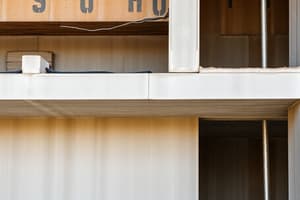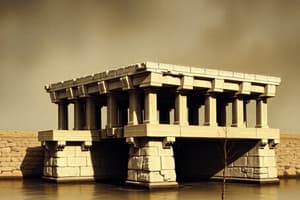Podcast
Questions and Answers
What is a key advantage of wooden frame structures?
What is a key advantage of wooden frame structures?
- High susceptibility to moisture damage
- Requires extensive bracing for strength
- Excellent shock absorption (correct)
- High thermal conductivity
Which type of wall is specifically designed to resist higher compressive loads and tension forces?
Which type of wall is specifically designed to resist higher compressive loads and tension forces?
- Reinforced Masonry Walls (correct)
- Cavity Masonry Walls
- Load-Bearing Masonry Walls
- Composite Masonry Walls
What is a disadvantage commonly associated with masonry structures?
What is a disadvantage commonly associated with masonry structures?
- Enhanced energy efficiency
- Time-consuming construction process (correct)
- Low vulnerability to seismic forces
- High design flexibility
What structural element does a steel frame utilize to resist lateral loads?
What structural element does a steel frame utilize to resist lateral loads?
Which type of masonry wall features hollow spaces to reduce moisture transfer?
Which type of masonry wall features hollow spaces to reduce moisture transfer?
What is essential for maintaining the structural integrity of masonry construction?
What is essential for maintaining the structural integrity of masonry construction?
What type of masonry wall is designed for improved structural integrity against wind or earthquake forces?
What type of masonry wall is designed for improved structural integrity against wind or earthquake forces?
What common masonry problem suggests that moisture issues are present?
What common masonry problem suggests that moisture issues are present?
Which type of frame structure is known for preventing soft storey collapse in tall buildings?
Which type of frame structure is known for preventing soft storey collapse in tall buildings?
Which type of masonry wall could act as both an interior and exterior wall and support structural loads?
Which type of masonry wall could act as both an interior and exterior wall and support structural loads?
Study Notes
Frame Structures
- Wooden Frame: Versatile, strong, and durable; good shock absorption; can incorporate various materials.
- Concrete Frame: Strong and cost-effective; relies on steel framework for support; bracing is crucial for lateral forces.
- Steel Frame: Offers cantilevered trusses for lateral loads; suitable for low to mid-height buildings; combines walls and frames; effective in preventing soft storey collapse in tall buildings.
Masonry Construction
- Materials: Includes bricks, stones, and concrete blocks; mortar binds materials together.
- Common Projects: Walls, arches, and fireplaces.
Types of Masonry
- Load-Bearing Masonry Walls: Transfer loads directly from the roof to the foundation; can act as both exterior and interior walls.
- Reinforced Masonry Walls: Enhance strength to withstand compressive loads and tension forces.
- Cavity Masonry Walls: Provide hollow spaces to control temperature and moisture.
- Composite Masonry Walls: Constructed with multiple unit types; offer economical versatility.
- Post-tensioned Masonry Walls: Strengthen walls against lateral forces; involves anchoring post-tensioning rods for increased structural integrity.
Advantages of Masonry Structures
- Durable and long-lasting with minimal maintenance requirements.
- Offer thermal mass benefits for energy efficiency.
- Aesthetic versatility with diverse design possibilities.
Disadvantages of Masonry Structures
- Time-consuming construction process.
- Limited design flexibility compared to other construction methods.
- Susceptible to seismic forces and moisture damage.
Common Masonry Problems
- Cracking: Can occur due to settling or thermal expansion.
- Efflorescence: A white powdery substance indicating moisture issues.
- Moisture Damage: Excess moisture can deteriorate masonry materials; proper drainage and waterproofing are essential.
Key Principles of Masonry
- Proper bonding between units is crucial for strength.
- Maintaining level courses ensures adequate support.
- Load distribution and moisture control are essential considerations.
Studying That Suits You
Use AI to generate personalized quizzes and flashcards to suit your learning preferences.
Description
Explore the principles of frame structures and masonry construction in this quiz. Learn about the characteristics of wooden, concrete, and steel frames, along with various types of masonry, including load-bearing and reinforced walls. This quiz is essential for civil engineering and architecture students.




